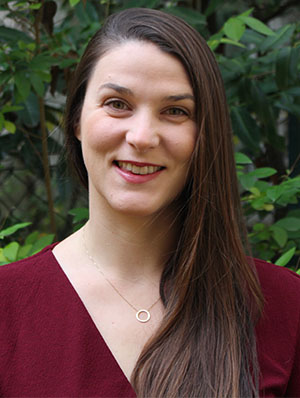About the lecture
Hercules and Queen Omphale of Lydia are perhaps the most notorious cross-dressers of Roman antiquity. According to the mythical tradition, this ultramasculine hero was either the queen’s slave, captivated lover, or both. During his servitude, they traded dress and roles: he donned feminine dress and did wool work, while she bore his club and lion skin and ruled over him. It is widely agreed that cross-dressing is an indispensable feature of their imagery, but there is no systematic analysis of this. The exchange of gendered dress is actually quite fluid. There was no single way for Hercules or Omphale to appear in the apparel of the opposite sex, even if their outfits did tend to follow certain patterns. They were continuously restyled in order to elicit certain reactions from the viewers: to produce an amusing spectacle, to appeal to private feelings, or to highlight exemplary qualities.
 About Dr. Hollaender
About Dr. Hollaender
Sarah Hollaender is a postdoctoral researcher at the Institute of Old Testament Studies, University of Graz. She is a member of the NCN-DFG Project “Judean Religion(s) in the Persian and Early Hellenistic Period (5th–3rd cent. BCE) in Light of Iconographic, Epigraphic and Biblical Sources”.
She is currently researching the iconography of the Southern Levant, as part of the broader aim of mapping the religious-historical landscape on the basis of biblical and extra-biblical sources. In addition, she is the co-chair of the Research Units "Historical Approaches to the Bible and the Biblical World" and "Jews, Christians, and the Materiality of Mortuary Rituals in Late Antiquity" at the European Association of Biblical Studies. She received her training in classical archaeology, with a special focus on topics like iconography, gender, and mythology. She brings this knowledge to her study of early Judaism and Christianity, by exploring questions of interaction and demarcation in visual culture.
Digital event - how to participate
The seminar will be held digitally. If you wish to attend a lecture, you need to register in advance.
A zoom link will be sent to you before the event.
You can download Zoom or use your browser: https://zoom.us/download
This lecture is part of the lecture series Ancient Adornment
Suggestions for further Reading
- J. Boardman, Omphale, in: LIMC VII (Zürich 1994) 45-53
- A. Coralini, Ercole e Onfale nella pittura pompeiana. Problemi di identificazione, Ocnus. Quaderni della scuola di specializzazione in archeologia 8, 2000, 69-92
- V. Dasen, Le secret d’Omphale, RA 2008, 265-281
- S. Oehmke, Entwaffnende Liebe. Zur Ikonologie von Herakles-Omphale-Bildern anhand der Gruppe Neapel-Kopenhagen, JdI 115, 2000, 147-197
- S. Ritter, Ercole e Onfale nell’arte romana dell’età tardo-repubblicana e augustea, in: C. Jourdain-Annequin – C. Bonnet (eds.), IIe rencontre héracléenne. Héraclès, les femmes et le feminine. Actes du Colloque Grenoble 22-23 octobre 1992 (Brussels 1996) 89-102
About the lecture series
A Digital Lecture Series on strategies of body adornment in ancient Mediterranean cultures
With this lecture series, we wish to reflect on different kinds of body adornment such as jewellery, headdresses, seals, staffs, weapons, tattoos, and cosmetics. It is our aim to investigate aesthetics and strategies of adorning bodies in ancient Mediterranean cultures, and to explore how body adornment relates to gender, hierarchy, and power.
Seven excellent international researchers, experts on the material cultures and texts of the ancient Mediterranean, will present a 30-minute lecture, followed by amble time for questions and discussion.
We are interested in mapping body adornment as broadly as possible and therefore we encourage our speakers to consider this topic from a multi-sensorial perspective and to give thought to both touch, smell, taste, hearing and vision.
Organizers
The lecture series is organized by Professor Anne Katrine de Hemmer Gudme and hosted by The Faculty of Theology at the University of Oslo and the Faculty’s research group Biblical Texts, Cultures and Receptions.
Ancient Adornment Programme - Fall 2024
- Friday September 13 at 3pm (Oslo): Dr. Uroš Matić: “Dress, Adornment and Coloniality of Gender and Desire in New Kingdom Egypt and Nubia”
- Friday September 27 at 3pm (Oslo): Dr. Sarah Hollaender: “Notorious Cross-Dressers? (Re)styling Hercules and Omphale in Roman Antiquity”
- Friday October 11 at 3pm (Oslo): Dr. Bruno Biermann: “Levantine Seals between the Material, Sensory, and the Social: Archaeological, Iconographic, and Exegetical Perspectives on Beauty, Power, and Dress”
- Friday November 1 at 3pm (Oslo): Dr. Susannah Rees: “Eye-paints in the Hebrew Bible: Looking for Meaning”
- Friday November 15 at 3pm (Oslo): Dr. Melanie Wasmuth: “Blossoms for eternity – floral jewellery in ancient Egypt”
- Friday December 6 at 3pm (Oslo): Dr. Laurence Darsigny-Trépanier and Dr. Anne Létourneau: “Bejeweled Biblical Animals: Constructing Gender with Non-Human Bling”
